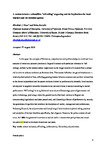A tension between rationalities: “off-rolling” as gaming and the implications for head teachers and the inclusion agenda
| dc.contributor.author | Done, Elizabeth | |
| dc.contributor.author | Knowler, H | |
| dc.date.accessioned | 2020-08-07T07:25:27Z | |
| dc.date.issued | 2020-09-11 | |
| dc.identifier.issn | 0013-1911 | |
| dc.identifier.issn | 1465-3397 | |
| dc.identifier.uri | http://hdl.handle.net/10026.1/16140 | |
| dc.description.abstract |
In this paper the concepts of fabrication, subjectivation and performativity are mobilised in an analysis of varied exclusionary practices in England’s schools with particular reference to “off-rolling”, defined by the national school inspectorate as the illegal removal of a student from a school roll in order to enhance academic performance data. This narrow definition has gained traction over a relatively short period of time, reflecting growing tension between economic and political rationalities as the former is prioritised and the power relations dictated by performativity intensify. Head teachers are required to negotiate normative demands to include and drivers to exclude according to market performance. “Off-rolling” is being fabricated as an object of knowledge, point of governance and policy technology, producing a taken-for-granted reality (that head teachers in England are circumventing legal school exclusion procedures) and illustrating a feature of performativity, namely, the generation of signifiers that reinforce the disciplines of market, management and performance. Following Foucault, the subjectivation and disciplining of head teachers implies dividing practices and ascription of deviant identities, specifically, that of gamer. However, the policy context of, and since, the 1990s has generated incentives to exclude while a concomitant policy discourse around inclusion failed to eliminate educational exclusion. | |
| dc.format.extent | 1322-1341 | |
| dc.language | en | |
| dc.language.iso | en | |
| dc.publisher | Taylor & Francis (Routledge) | |
| dc.subject | school exclusion | |
| dc.subject | off-rolling | |
| dc.subject | performativity | |
| dc.subject | fabrication | |
| dc.subject | subjectivation | |
| dc.title | A tension between rationalities: “off-rolling” as gaming and the implications for head teachers and the inclusion agenda | |
| dc.type | journal-article | |
| dc.type | Journal Article | |
| plymouth.author-url | https://www.webofscience.com/api/gateway?GWVersion=2&SrcApp=PARTNER_APP&SrcAuth=LinksAMR&KeyUT=WOS:000567972700001&DestLinkType=FullRecord&DestApp=ALL_WOS&UsrCustomerID=11bb513d99f797142bcfeffcc58ea008 | |
| plymouth.issue | 7 | |
| plymouth.volume | 74 | |
| plymouth.publication-status | Published | |
| plymouth.journal | Educational Review | |
| dc.identifier.doi | 10.1080/00131911.2020.1806785 | |
| plymouth.organisational-group | /Plymouth | |
| plymouth.organisational-group | /Plymouth/Faculty of Arts, Humanities and Business | |
| plymouth.organisational-group | /Plymouth/REF 2021 Researchers by UoA | |
| plymouth.organisational-group | /Plymouth/REF 2021 Researchers by UoA/UoA23 Education | |
| plymouth.organisational-group | /Plymouth/Users by role | |
| plymouth.organisational-group | /Plymouth/Users by role/Academics | |
| dcterms.dateAccepted | 2020-08-02 | |
| dc.rights.embargodate | 2022-3-11 | |
| dc.identifier.eissn | 1465-3397 | |
| dc.rights.embargoperiod | Not known | |
| rioxxterms.version | Accepted Manuscript | |
| rioxxterms.versionofrecord | 10.1080/00131911.2020.1806785 | |
| rioxxterms.licenseref.uri | http://www.rioxx.net/licenses/all-rights-reserved | |
| rioxxterms.licenseref.startdate | 2020-09-11 | |
| rioxxterms.type | Journal Article/Review |


